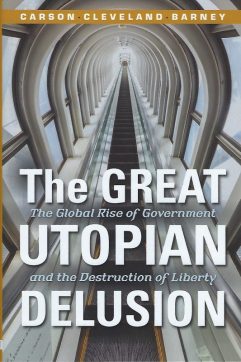A massive struggle is underway. It is nothing less than the existential[i] struggle for the survival of civilization as we have known it. It is a covert struggle. Those who aim to destroy Western civilization and its commitment to individual freedom and liberty do all they can to conceal the struggle. Indeed, even as they seek to destroy individual freedom, they often use the words of freedom and liberty in their speeches. Nevertheless, once their tactics are understood, their effort becomes obvious to anyone willing to look. It is the struggle over who knows what is best for the individual’s ultimate happiness and who should be able to control how it is achieved.
The Great Utopian Delusion
Those seeking to transform society truly believe that maximum happiness on earth can be attained by coordinating all human activity toward some predetermined end that is thought to be for the common good. Their utopianism is so deeply held that they will justify almost anything to attain their elusive end. Contemporary intellectuals believe that they are able to rise above the rest of humanity to see what they assume others cannot see. They view people as nothing more than sensual beings caught in the grip of their own passions and desires. As they see it, we are little more than animals struggling for survival, either unwilling or unable to make the best choice. As such, they view mankind as a herd in desperate need of a leader who can define what should be the ultimate vision. To achieve their vision, they must motivate or force total compliance. They tend to reduce the individual to a social security number, a credit score, or some other impersonal identity. They believe that they, alone, are capable of determining the common good and imposing it upon the rest of humanity.
Importance of the Individual
On the other side of the struggle are individuals who wish to make their own choices, to control their property, and to retain their privacy and freedom in thought and action. They find ways to pursue their personal happiness in life for the benefit of themselves and those who matter most to them. Those who truly believe in the importance of individuality know that this world is going to be filled with various hardships. Some of these are the result of poor choices and some are the result of unfortunate circumstances. Whatever the case may be, they understand that surviving these problems leads to growth and maturity. In overcoming the struggles of life their character is built. While there are surely those in need of help along life’s way, those on this side of the struggle know that the general condition of the individual should be one of freedom and liberty in the pursuit of one’s happiness in this world.
Necessity of Force and Coercion
Ever since the fall of man the world has been cursed. While there are certainly pleasurable times of peace, these are often interrupted by hardship. This reality cannot be changed through the application of force any more than collective action can halt the arrival of a blizzard, change the climate, or stop an earthquake. Nevertheless, socialists somehow believe that they can achieve such peace and harmony among people and with nature by using force.
Despite all their efforts, people continually resist. Often, only the individual knows his means of resistance for he would be subject to penalties if it were revealed. If resistance is identified, governments stand ready to use force to bring the individual back in line with the supposed collectivist “common good.”
Under socialism, force and coercion are used to achieve the ends defined by those holding the political power. But man is not merely a number or a cog in a larger machine and it is not the job of kings and leaders to discern what constitutes the highest social end and to impose it upon the individual from the top down. Early Christian writers were clear on the subject. In Book IV of The City of God, St. Augustine exposed the flawed logic in trying to justify government action that violates the natural rights of people:
Justice removed, then, what are kingdoms but great bands of robbers? What are bands of robbers themselves but little kingdoms? The band itself is made up of men; it is governed by the authority of a ruler; it is bound together by a pact of association; and the loot is divided according to agreed law. If, by the constant addition of desperate men, this scourge grows to such a size that it acquires territory, establishes a seat of government, occupies cities and subjugates peoples, it assumes the name of kingdom more openly. For this name is now manifestly conferred upon it not by the removal of greed, but by the addition of impunity. It was a pertinent and true answer which was made to Alexander the Great by a pirate whom he had seized. When the king asked him what he meant by infesting the sea, the pirate defiantly replied: ‘The same as you do when you infest the whole world; but because I do it with a little ship I am called a robber, and because you do it with a great fleet, you are an emperor.’[i]
Human beings are not the means to be employed by others to achieve their ends. Who would want to live in such a circumstance? The individual is of great value and ought not be forced or coerced to do someone else’s pleasure, for that is slavery.
Acknowledging Individual Responsibility
Recognizing one’s individual responsibility is the key that unlocks the door of the collective prison in which we are caught. There is no such thing as collective, organizational, or corporate responsibility. All responsibility is individual and personal. People sometimes make such silly statements as if they are speaking for an organization or a group of people. Of course, this is impossible for organizations have no thoughts that can be expressed. There is no collective guilt, for the collective has nothing with which to register guilt. Nor is there any collective responsibility.
Indeed, a fundamental flaw in collectives and organizations is their ingrained and irreversible irresponsibility. As soon as control is exerted over people—whether by private businesses or governments—the individuals within the group tend to believe they are no longer responsible for what they do. Make a complaint to someone in an organization and the most likely response will be: “Look, I just work here.” Who has not heard it? What the person is saying is that he is not responsible for what the organization does. He knows that if he does not personally control what is being done then he is not responsible for it.
Likewise, individuals do not feel any sense of wrongdoing when they benefit from the actions of the collective that they know would be morally wrong if they did them. As pointed out by Leonard Read:
Now take note of a startling fact. Those who wouldn’t personally steal a dollar from anyone will favor the government stealing for them [by way of taxation] and with no sense of sin or guilt. . . . ‘I wouldn’t steal your horse but it’s all right if someone else does the stealing for me!’[ii]
But trying to escape from our personal responsibility is not so easy.
The socialist idea is propelling us in a profoundly wrong direction. It has led to multiple disasters and will continue to do so as long as people are fooled by it. Proponents of the socialist ideal are fighting against human nature. It is an effort to transform man, to reduce him to those aspects thought to be “socially useful,” to integrate him into massive systems, and to subjugate him. This ideal can only be pursued by intimidating and forcing individuals to do things they would not otherwise do. Thus, society is transformed into an instrument of force. Government becomes pervasive and acts in ways in which it is neither suited nor effective.
The Division of Society
All this misdirected effort has produced a pronounced division in society. In part the struggle is to determine who can possess and control property. More importantly, it is ultimately a struggle over who is going to control whom. Socialism in all its collectivist forms, whether it is corporatism, welfarism, fascism, or communism, aims to wrest the control of property from its rightful owner against his will and to give that control to someone else. Such control renders the individual impotent.
In the evolutionary socialism seen in America the seizing of control has come about through heavy confiscatory taxation, inflationary monetary policies, and the establishment of an impenetrable web of regulations. Government subsidies and price supports that benefit some special interests are merely a means of robbery. Businessmen in gradualist countries generally use what leverage they have to influence government. They invest large sums of money to lobby for special privileges that will enhance the value of their specific capital investments over and against the genuine property rights of other people. The justification for government infringement on the natural rights of some individuals is that it promotes the common good. But all their redistribution and restrictions are nothing short of legalized theft, and they ought to be called that. Capitalism is usually blamed as the cause of these privileges, but it is not. The real cause is the transformation of capitalism into socialism.
The Flawed Nature of Humans
People are not defective machines. While it is certainly true that selfish passions in the human heart have led to all manner of hardships for us, the answer is not socialism. The individual is not a cog to be reworked and fitted into some grand organization. He is a soul. He has both a mind and a body and is meant to grow and flourish in the course of this life. Above all, he is meant to be responsible for himself.
It is certainly true that we human beings are very imperfect and sinful. The truth is that all of us behave rather foolishly on occasions. We can all attest to the suffering we have caused others and ourselves by such behavior. However, the answer to our failures in this life is not to make us permanent dependents upon a government that rescues us from the consequences of our foolish behavior. Rather, the answer is that we need to grow up. We need to stand on our own two feet and accept personal responsibility. Our failure to accept responsibility has produced the void that has allowed force to rush in.
The Only Source of Rescue
The first step towards adulthood is to take seriously the gospel message of Jesus Christ. The first part of this message is actually not good news, but rather bad news. It recognizes that we have all fallen very far short of God’s standard of righteousness. Moreover, if we had to stand before God for judgment based upon our own merits we would be individually condemned forever and ought to spend eternity in hell. The good news is that Jesus is the Son of God incarnate. That is, the second person of the Trinity entered into this world as a man. He lived a life of perfect submission to the Father and then willingly gave himself up to suffer the penalty for our unrighteousness. Therefore, when we humble ourselves before him and confess our need of him, he graciously redeems us to a new life. This is a very personal act. From that beginning point there is a new hope of living more and more for the glory of God as we enter into a relationship with him that can continually grow throughout our individual lives. In other words, we begin to trade the chaos of our lives for God’s peaceful order of life. The collectivists of today have rejected this offer and have chosen instead to look to government to redeem their life from the consequences they experience in the fallen world. In doing so they embrace a rising tide of chaos both in their own lives and in society.
Responsibility for the Decline of Civilization
There is not one among us with perfectly clean hands in today’s spiraling decline of civilization. Whenever we have sought governmental solutions to our material problems we have called for the use of force and coercion to extract something from our fellow man that he would not have otherwise given for our use. In doing so, we contributed to the decline. It does not matter what our intentions were. It does not matter whether the goods in question were education or health care or something else thought to be necessary for our own advancement, or even that of some needy person’s. Anytime we advocate transfer payments from others we are calling for violence to be used against our neighbors to achieve our own desired ends, thus setting aside the eighth commandment. If you doubt this, consider what would happen to the individual who disagreed with your desired ends and thus resisted paying some portion of their taxes. Governments simply have no ability to provide such things without violating someone among us. Rather, we should engage in personal acts of true charity, which is always a voluntary, individual act.
Socialism is grossly irresponsible, and it promotes greater irresponsibility among people generally. While socialists outwardly claim that they are concerned about the needs of others, the claim does nothing more than conceal the reality of what is being done. In a collectivist environment every man grabs whatever he can, according to his position of power in the system. The lies of the politicians are of little value to the most downtrodden and oppressed among us. Their vain promises are nothing more than a mocking reminder of the concealed greed that is really at the heart of their plans.
In contrast to the decline of individual responsibility and personal liberty that we are experiencing, we could have so much more. A great deal of effort is currently being invested in “organized labor” and “community organizing”. It is not for the individual to coordinate economies or to direct the efforts of others. The great task before us is one of disorganization, the disorganization of education, the disorganization of health care, the disorganization of banking, and so on. This can be accomplished mainly by advocating for removing government privileges, subsidies, and operations from all constructive activities. Moreover, when each individual accepts the responsibility to use his God-given talents to secure his own life, he will break free from governmental dependency. This is the path to the most complete experience of human flourishing.
[i] The term existential has lost much of its meaning because it has been misused a great deal lately. The argument is being made here that there is a struggle that is existential to civilization. This is so because there is a very real possible outcome that threatens the very existence of the social norms such as rule of law, protection of natural rights, free markets, due process, etc., which have made possible the level of human flourishing we currently experience.
[ii] Saint Augustine, Bishop of Hippo, The City of God Against the Pagans, trans. and ed. R.W. Dyson (Cambridge, UK: Cambridge University Press, 1998), 147–48.
[iii] Leonard E. Read, Notes from FEE (March, 1979), 1.
Read More
In just 100 pages you can understand the delusion socialists are encouragng you to join.
4 reviews for The Great Utopian Delusion by Paul Cleveland
Only logged in customers who have purchased this product may leave a review.








Mary Anne Turnbull (verified owner) –
Paul Cleveland is a brilliant professor, but in this book he explains the big idea behind so much of what affects our culture and society today in terms that those of us with simpler minds can clearly grasp. I really enjoyed reading this and appreciate the clear and straightforward presentation of truth. I strongly recommend that every serious American should read it.
Matt Davis (verified owner) –
In his latest book, Dr. Cleveland clearly explains the motives behind so many of the destructive policies that are affecting our nation and world today. After reading this book you will have a better understanding of why national and international leaders are making the decisions they make and how it will affect all of us. I am hopeful that his next book will help us understand what steps we can take, as individuals, communities, and a nation, to avoid the disasters in store for us.
Jim King (verified owner) –
An awesome book and a must read. Well written. Would be great if our leaders had even the basics of this understanding.
Eric McLeRoy –
Thank you Dr. Paul for publishing the Truth!! This book should be a required read for all middle school children. Our children deserve to learn the truth and not to be brainwashed by public schools.